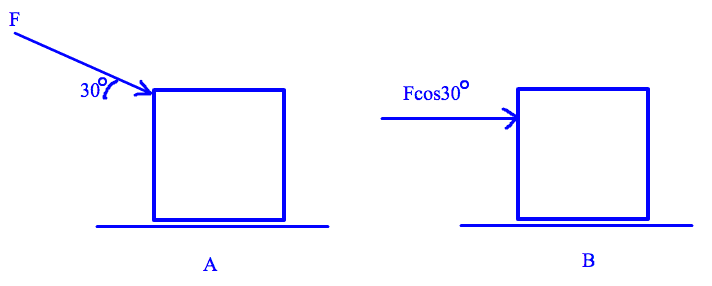Two people push a box equal distances along an effectively frictionless surface. One pushes the box at an angle of 30° to horizontal with force F while the other pushes the box horizontally with force Fcos30°. Which person does the most work?
a) Person A
b) Person B
c) Person A and B do equal amounts of work
d) cannot be determined
Explanation
Work is only done by force parallel to the direction of motion per the relationship W=Fdcosθ, and proportional to the distance over which the force is applied. For person A, the vertical component of force F, Fsin30°, does no work since the box moves neither up nor down. Only the horizontal component of the force, Fcos30°, does any work. For both person A and B, only the force parallel to the motion of the box over the surface does any work. Therefore, the work done by person A and B is equal.
a) Person A, incorrect.
b) Person B, incorrect.
c) Person A and B do equal amounts of work, correct.
d) cannot be determined, incorrect.
Want more MCAT practice?
We’ve got options for every schedule and learning style!
From the best online MCAT course created by top instructors with 524+ MCAT scores to the most representative full-length practice exams and private tutoring, we can custom tailor your MCAT prep to your goals!
Not sure which option is right for you? Schedule a free MCAT consultation with an MCAT expert using the form below. No obligation, just expert advice.
Search the Blog

Free Consultation
Interested in our Online MCAT Course, One-on-One MCAT Tutoring or Med admissions packages? Set up a free consultation with one of our experienced Senior Student Advisors.
Schedule NowPopular Posts
-
MCAT Blog What's on the MCAT?
-
MCAT Blog How to Review MCAT Full Lengths

Free MCAT Practice Account
Need great MCAT practice?Get the most representative MCAT practice possible when you sign up for our free MCAT Account, which includes a half-length diagnostic exam and one of our full-length MCAT practice exams.
Learn More







